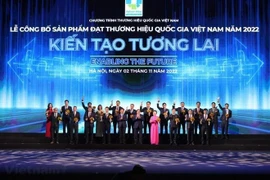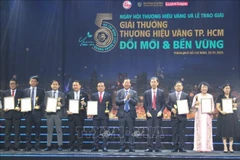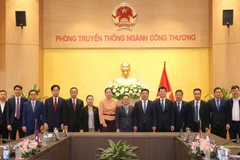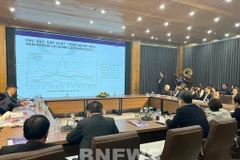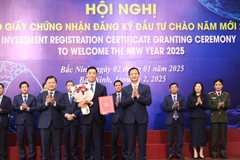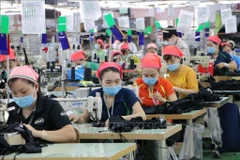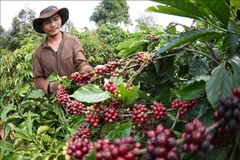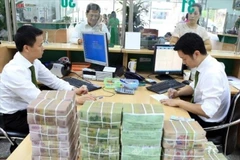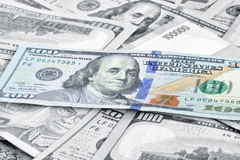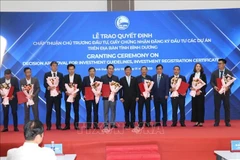Hanoi (VNS/VNA) - As one of the countries with the fastest-growing national brand globally, Vietnam is cementing its position on the global economic map. This remarkable achievement reflects the relentless efforts of the Government and business community, as well as recognition from prestigious international organisations.
Before 1986, the concept of 'branding' was virtually nonexistent among Vietnamese businesses. During the early years of the Doi moi (renewal) process, the idea of a business growing its brand was largely overlooked, as enterprises focused primarily on the domestic market, with minimal involvement in international trade or export activities.
From 1995 onwards, as Vietnam embraced economic reforms and international integration and so the notion of a national brand began to take hold. Initially limited to trade and import-export sectors, the concept gradually expanded to include culture, tourism, media and technology.
The Vietnam Value Programme, a distinctive and long-term trade promotion initiative, was launched under the Prime Minister’s Decision No. 253/2003/QĐ-TTg, issued on November 25, 2003. Focused on three core values - quality, innovation, and pioneering capacity - the programme aims to showcase Vietnam’s image and build a strong national brand through high-quality products.
In 2008, April 20 was designated as Vietnam Brand Day, an annual event to honour and promote the country's unique products and established marks. The number of businesses receiving the Vietnam Value title has grown significantly, from 30 in 2008 to 190 in 2024, representing 359 products that embody Vietnam’s national brand.
Over the past 20 years, the Vietnam Value Programme has played a pivotal role in helping enterprises build and promote their brands, boosting production, business growth and exports. These efforts have established Vietnam’s reputation as a nation producing high-quality goods and services with strong competitive edge across many international markets.
Vietnam’s national brand has achieved remarkable heights, leaving an indelible mark on the global branding landscape. In 2023, Brand Finance, the world’s leading independent brand valuation consultant, valued Vietnam’s national brand at US$498.13 billion, a 15.6% increase from 2022. This ranking placed Vietnam 33rd among the world’s 121 strongest national brands. Between 2019 and 2023, the value of Vietnam’s national brand grew by 102%, making it one of the fastest-growing brands in the world.
Breakthrough solutions
To further elevate Vietnam’s national brand, the country must implement groundbreaking strategies while maximising its core potential and values.
Despite its impressive achievements, Vietnam faces challenges in sustaining and developing its national brand. These include a lack of links between certain brands and high-quality export products, reliance on raw or unbranded exports and increasing competition from neighbouring and global economies that are also prioritising brand development.
To take Vietnam’s national brand to new heights, breakthrough solutions are needed. These solutions must centre on enterprises, while ensuring concerted collaboration among governmental agencies and support from society.
A crucial step in advancing Vietnam’s national brand is raising awareness among businesses and society about the significance of branding. According to Hoang Minh Chien, Deputy Director of the Vietnam Trade Promotion Agency (Vietrade) under the Ministry of Industry and Trade (MoIT), branding not only adds value to products, but also serves as a strategic tool for businesses to position themselves in the global marketplace.
Organising communication campaigns, specialised seminars and awareness-raising initiatives is therefore vital. Additionally, integrating branding education into university curricula, particularly in economics and business administration, can lay a solid foundation for future generations to contribute to national brand development.
Enterprises are at the centre of Vietnam’s national brand development strategy. Supporting businesses in brand building and management is essential for strengthening their internal capabilities. Chien emphasised the importance of ongoing support for small and medium-sized enterprises (SMEs) through specialised training programmes, financial assistance and technical support.
He also said that encouraging the adoption of modern technologies for brand management and improving product quality would empower Vietnamese businesses to establish strong, globally competitive names which resonate across markets.
In the context of climate change and the increasing trend of sustainable consumption, building the manufacture of products aligned with green values is critical to enhancing Vietnam’s national brand.
Deputy Minister of Industry and Trade Nguyen Sinh Nhat Tan stressed that Vietnam’s national brand must be defined by quality, and its commitment to environmental protection and sustainable development. Thus, businesses were encouraged to adopt circular economic models, use recycled materials and minimise waste.
According to the MoIT, demand for green products in Vietnam grew by an average of 15% annually from 2021 to 2023. Furthermore, 72% of Vietnamese consumers are willing to pay more for eco-friendly products, signalling an opportunity for enterprises to enhance product value, while improving Vietnam’s global brand image.
According to Managing Director of Brand Finance Asia-Pacific, Alex Haigh, a strong national brand is defined not only by product quality, but also by the values it represents. To effectively promote these values, businesses should fully exploit digital platforms such as social media and e-commerce for product promotion.
Participation in international trade fairs and trade promotion programmes provides another venue to introduce Vietnam’s national brand-certified products to global markets, affirming their values and positioning.
Chien stressed that protecting intellectual property was a prerequisite for sustainable development. Businesses must register their intellectual property rights both domestically and internationally, particularly in major trading partner countries, he said. Governmental agencies should also strengthen legal frameworks to address brand disputes and enhance the intellectual property protection system.
With innovative solutions and the concerted efforts of the business community, Vietnam is poised to achieve its goal of becoming one of the region’s strongest national brands. This advancement will elevate the country’s standing, while fostering sustainable economic, alongside cultural and social development./.

